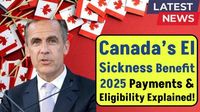As inflation continues to strain the finances of many Canadians, the Canada Revenue Agency (CRA) is set to implement significant changes to its financial assistance programs in 2025. Notably, retirees will see an increase in their Canada Pension Plan (CPP) monthly payments, while workers facing medical challenges can benefit from the Employment Insurance (EI) Sickness Benefit. These adjustments aim to provide essential support for individuals grappling with rising living costs and health-related financial burdens.
The CRA has announced that starting in April 2025, eligible retirees will receive a CPP Monthly Payment Increase. This increase is designed to help seniors manage their expenses in light of inflation and the rising cost of living. According to the CRA, the monthly payment amount for retirees could reach up to $1,433, depending on individual contributions and eligibility criteria.
For many retirees, the CPP serves as a crucial financial safety net. It is part of Canada’s broader retirement income system, which also includes Old Age Security (OAS) and other benefits. The CPP is funded through mandatory payroll deductions made by employees and employers alike, ensuring that those who contribute receive financial support during retirement.
Eligibility for the CPP payment increase hinges on several factors. Applicants must be legal residents of Canada and have made at least one valid contribution to the CPP. This means that individuals who have worked and contributed to the plan throughout their careers can access this financial support when they retire.
In addition to the CPP increase, the EI Sickness Benefit is also receiving updates that will enhance its support for workers unable to work due to illness or injury. Starting in 2025, the weekly payment amount for the EI Sickness Benefit will be 55% of the average weekly insurable earnings, up to a maximum of $695 per week. This benefit is essential for those recovering from surgeries, managing serious illnesses, or quarantined due to health concerns.
To qualify for the EI Sickness Benefit, applicants must meet specific eligibility criteria. This includes having a valid medical certificate from a licensed healthcare provider, confirming their inability to work due to medical reasons. Additionally, applicants must demonstrate a minimum 40% reduction in their weekly earnings and have accumulated at least 600 insurable hours within the past 52 weeks.
One of the most significant changes to the EI Sickness Benefit is the extension of the benefit duration from 15 weeks to 26 weeks. This change, effective since December 2022, allows individuals more time to recover from their medical conditions without the added stress of financial insecurity.
As Canadians prepare for these changes, understanding the application processes and payment schedules is vital. For the CPP payment increase, eligible individuals can expect their payments to begin on April 15, 2025. It is crucial for retirees to stay informed about their contributions and eligibility to maximize their benefits.
Moreover, those applying for the EI Sickness Benefit can submit their applications online through the Government of Canada’s website. The application process requires several documents, including a medical certificate and records of employment from the past year. Ensuring that all necessary paperwork is submitted promptly can help expedite the approval process.
In light of these financial support programs, Canadians are encouraged to explore all available options to enhance their financial security. For retirees, combining CPP benefits with other income sources, such as OAS and GIS, can create a more stable financial foundation. Similarly, individuals facing health challenges should consider additional employer benefits, such as paid sick leave or short-term disability plans, which may supplement their EI Sickness Benefits.
As inflation continues to impact daily life, the federal government’s initiatives to increase financial support for retirees and those facing medical challenges reflect a commitment to ensuring that all Canadians can maintain a decent standard of living. With the CPP payment increase and the enhanced EI Sickness Benefit, many individuals will find relief as they navigate these challenging times.
In summary, the upcoming changes to the CPP and EI Sickness Benefit programs represent a proactive approach to addressing the financial strains caused by inflation and health issues. By understanding eligibility criteria, application processes, and payment schedules, Canadians can better prepare for their financial futures in 2025 and beyond.






